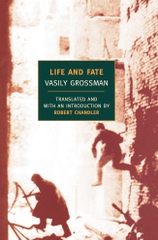A book judged so dangerous in the Soviet Union that not only the manuscript but the ribbons on which it had been typed were confiscated by the state, Life and Fate is an epic tale of World War II and a profound reckoning with the dark forces that dominated the twentieth century.
Interweaving a transfixing account of the battle of Stalingrad with the story of a single middle-class family, the Shaposhnikovs, scattered by fortune from Germany to Siberia, Vasily Grossman fashions an immense, intricately detailed tapestry depicting a time of almost unimaginable horror and even stranger hope. Life and Fate juxtaposes bedrooms and snipers’ nests, scientific laboratories and the Gulag, taking us deep into the hearts and minds of characters ranging from a boy on his way to the gas chambers to Hitler and Stalin themselves. This novel of unsparing realism and visionary moral intensity is one of the supreme achievements of modern Russian literature.
Vasily Grossman is the Tolstoy of the USSR.
—Martin Amis
What better time to read Life and Fate, Vasily Grossman’s epic novel about the second world war, to put our current troubles into perspective? Grossman’s book, which traces the fate of the family of the brilliant physicist Viktor Shtrum at the time of the Battle of Stalingrad, records how humanity endured the monstrous evils of Nazism and Stalinism, surviving like weeds in the cracks of concrete slabs.
—John Thornhill, Financial Times
No. 1 on Antony Beevor’s “Five Best of World War II Fiction” list
—The Wall Street Journal
One of the greatest works of literature to come out of Russia during the 20th century, Life and Fate could be looked at as the closest thing the Second World War had to a War and Peace. An absolute sprawling and haunting masterpiece that should be on every list.
—Flavorwire
A delightfully readable 2006 translation by Robert Chandler, this edition preserves nearly all the color of Russian sayings and dark humor while remaining a devastating portrait of Stalin’s Russia. Grossman shows how Russian communism was a moral and ideological dead end, an almost exact counterpart to Hitler’s Nazism that was preordained from the moment Lenin began killing his opponents instead of talking to them...In the end, he leads the reader to the inescapable conclusion that Communism, like Nazism, had only one goal: power. Coming from a man who once sat in on the privileged inner circles of this government, as an acclaimed journalist and author, this is a devastating message indeed.
—Forbes
A chronicle of the past century’s two evil engines of destruction-Soviet communism and German fascism—the novel is dark yet earns its right to depression. But it depresses in the way that all genuinely great art does—through an unflinching view of the truth, which includes all the awfulness of which human beings are capable and also the splendor to which in crises they can attain. A great book, a masterpiece, Life and Fate is a book only a Russian could write.
—Joseph Epstein, The Wall Street Journal
Grossman’s depiction of Soviet citizens as they struggle to survive is magnificent. Life and Fate has been called the greatest Russian novel of the 20th Century. I agree.
—Daytona Beach News
World War II’s War and Peace. Written (mainly) from the vantage point of a Soviet Jew, this masterpiece was judged far too ambivalent in its treatment of the ‘Great Patriotic War’ to be published in the author’s lifetime.
—Niall Ferguson, The New York Times
Grossman’s account of Soviet life—penal, military and civilian—is encyclopedic and unblinkered . . . enormously impressive . . . A significant addition to the great library of smuggled Russian works.
—The New York Times Book Review
Takes its place beside The First Circle and Doctor Zhivago as a masterful evocation of the fate of Russia as it is expressed through the lives of its people.
—USA Today
Among the most damning indictments of the Soviet system ever written.
—The Wall Street Journal
[An] extraordinarily dark portrait of Soviet society.
—David Remnick, The Washington Post
Fascinating and powerful . . . Life and Fate does something that, as far as I know, no other novel has tried to do fully—and that is to portray believing Soviet Communists as ordinary characters, rather than as predictable embodiments of evil.
—Vogue
Vasily Grossman’s novel ostensibly concerns World War II, which he covered as a Soviet war correspondent. But his true subject is the power of kindness—random, banal or heroic—to counter the numbing dehumanization of totalitarianism. . . . By the novel’s end, both communism and fascism are reduced to ephemera; instinctive kindness, whatever the consequences, is what makes us human.
—Linda Grant, The Wall Street Journal blog


